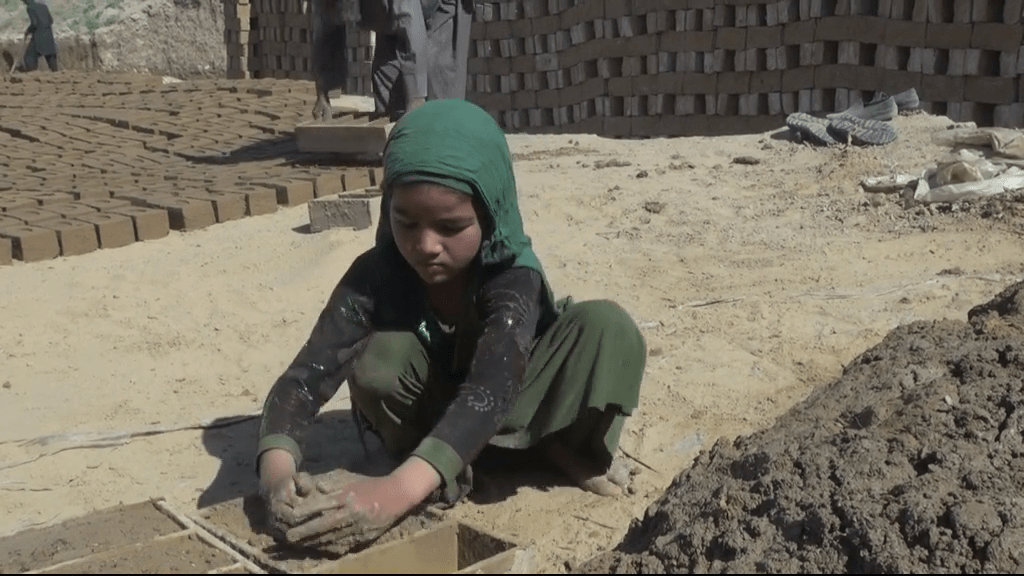SHIBERGHAN (Pajhwok): Ten-year-old Zakia dreams to become a doctor but she is forced by poverty to make bricks with her little hands in order to support her family in northern Jawzjan province.
Zakia currently lives in Khaton village of Shiberghan, capital of Jawzjan. She works with her father and mother in the brick kiln.
The girl, now a skilled worker, puts the clay into mold and then carries the wet brick to the kiln after passing some distance.
Working with father, mother and uncle, Zakia also turns the bricks to get dried under the sun. She also collects the dried bricks and takes them to the kiln.
Zakia is no longer interested in playing toys with other children because she is busy doing the hard labor.
.jpg)
Pajhwok Afghan News reporter who visited Khaton village, said: “I saw Zakia first two years ago when I visited her family suffering from poverty. I visited this family again. I was thinking Zakia would have grown up, but she has turned weaker and smaller.”
Talking to the Pajhwok reporter, Zakia said she had no option but to work due to their poor economic situation.
“I have to work to support my family, we jointly make bricks soon after we wake up in the morning and our father prepares the clay,” she said.
She said she earned 200 afghanis to 400 afghanis each day and spent the money on her family’s daily needs.
Zakia, a grade three student, said her wish was to become a doctor. “I am not sure I will reach this goal in life, but I use to share this with classmates.”
Feeling tired, she said: “Making bricks is a hard job, but I am adapted to it, if I was given a chance, I would want to become a doctor or engineer.”
“I know poverty will not allow me to think much about education and school. We are obligated to make bricks to survive,” Zakia added disappointedly.
Asadullah, father of Zakia, said: “We are an eight-member family. Conflicts and drought displaced us from Sayad district to Shiberghan. We have no way but to work hard to survive.”
He said 30 other families affected by conflicts lived with them in the area and all lived in extremely bad situation.
“At least 40 children of these families do not go to school instead work with parents in brick kilns,” he said.
He criticized the government and said no government official had visited them to see their situation.
“Only during Eid holydays, a Pajhwok reporter brought some meat and cash donated by others to us,” he added.
Hajira, aunt of Zakia, said: “I don’t know what future these children would have. They probably face more problems in future if their current situation continues.”
“We need food, doctor and medicines to continue our life, but we hardly have access to these and we are deprived of most of basic services,” she said.
She asked the government and aid organizations to help them find access to at least basic life facilities.
Amanullah Zargar, owner of a brick kiln in Khaton area, said at least 30 families belonging to Sar-i-Pul province worked in his factory.
“These families always come to me after the snow melts every year for work, I also lend them money during winter season and they pay me back by working with us in summer,” he said.
He said all families affected by war and drought worked in kilns and earned from 1,000 to 2,000 afghanis as wages.
“Children also work alongside their families making bricks, I pay them 400 afghanis for making 400 bricks,” he said.
Dr Ahmad Shah Qarar, UNICEF in charge in Shiberghan said: “We have prepared some programs for children engaged in hard labor in the city and some parts of this province.”
He said the programs included educating and awareness creating about children’s rights to people.
Families suffering from economic hardships were provided vocational trainings, he added.
Meanwhile, Mualvi Lotfullah Azizi, Jawzjan governor, said he was aware of the bad situation of displaced families in Khaton area and they would soon be assisted.
mds/ma








GET IN TOUCH
NEWSLETTER
SUGGEST A STORY
PAJHWOK MOBILE APP